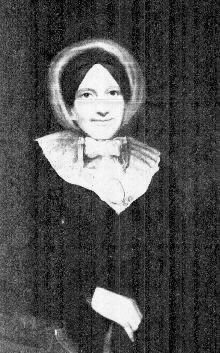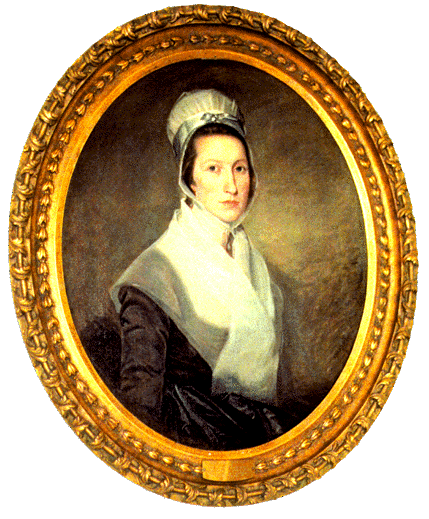

Priscilla Dorsey Ridgely (1762-1814)
MSA SC 3520-2244
Wife of Charles Carnan Ridgely, Governor of Maryland 1816-1819
 |
 |
Prudence Ridgely
Howard | Priscilla Dorsey Ridgely attributed to Rembrant Peale also attributed to Joseph Wright, c. 1790 Maryland Commission on Artistic Property, Maryland State Archives, MSA SC 1545-1209 |
The progenitor of the Dorsey family in Maryland was Edward Dorcy, Priscilla Dorsey Ridgely's great, great grandfather, who migrated to Maryland from Virginia in 1649. He acquired property in Anne Arundel County and settled near the Severn River in 1650. Genealogist Henry Ridgely Evans claims that the surname Dorsey/Dorcy is a possible corruption of Darcy or D'Arcy. Through his research, Evans has discovered several Dorseys and Darcys among a group of Puritan dissenters in early seventeenth century Virginia; therefore, Evans theorized that Edward Dorcy came to Maryland seeking refuge from "proscriptive laws against Nonconformists" which existed in the Virginia colony at the time. Evans concludes that Edward chose Maryland because it was known as a place of toleration where "all Christian sects were on a plane of equality and none were persecuted." 1
Born on July 12, 1762, Priscilla Dorsey was the youngest of Priscilla Hill and Caleb Dorsey, Jr.'s nine children. Priscilla's siblings included brothers Edward, Henry Hill, Samuel, and sisters Mary, Milcah, Rebecca, Peggy Hill, and Elinor. 2 Dorsey family legend weaves a romontic tale of Caleb and Priscilla's first meeting. Finding himself lost in the vicintiy of West River during a fox hunt, young Caleb Dorsey resigned himself to spending the night in the forest while waiting for a fellow hunter to find him. Suddenly, as the story goes, a young lady as breathtaking as the goddess Diana appeared on horseback. This purported beauty was Miss Priscilla Hill, and she directed Caleb to her family's home, where her parents Mary Denwood and Dr. Henry Hill, according to the customs of hospitality, welcomed the stranger and offered him accommodations for the night. Supposedly, Caleb Dorsey completely enchanted the family, especially young Priscilla, and ended up staying for several days. After this initial meeting, the couple continued to strengthen their ties as Caleb made many visits to the Hill family home until he asked Priscilla to become his bride. 3
Upon his marriage, Caleb's parents, Elinor Warfield and Caleb Dorsey, Sr., granted the newlywed couple a tract of land near the Patapsco River in Howard County called "Moore's Morning Choice" on which Caleb, Jr. built a vast plantation known as "Belmont." He inscribed the initials "C. and P.D." in stone above the main portal of the mansion to signify the home's first occupants and the year "1738" to denote when "Belmont" was completed. 4 Caleb supported his family by farming the plantation lands and by operating an iron forge and foundry with his brother, Edward. 5
In 1760, Priscilla and Caleb's daughter Rebecca married Captain Charles Ridgely and moved into his estate, "Hampton," in Baltimore County. It is most likely through this connection that Captain Ridgely's nephew, Charles Ridgely Carnan, met Rebecca's youngest sister Priscilla. Since his birth on December 6, 1829, Rebecca and Charles Ridgely acted as a second set of parents to their nephew Charles Carnan, son of Achsah Ridgely and John Carnan. It is possible that they introduced Priscilla and Charles, or that the couple met at a family gathering. Regardless of how the met, Priscilla and Charles Carnan were married on October 17, 1782 at Old Saint Paul's Church in Baltimore. Although they owned homes in Baltimore and Annapolis, the newlyweds moved into "Hampton" with Charles and Rebecca. 6
Captain Ridgely died in 1790 and named Charles Carnan one of his principal heirs. The only stipulation of the will was that Charles had to legally change his surname from Carnan to Ridgely. Although, Captain Ridgely bequeathed "Hampton" to his wife Rebecca, she gave the estate to Charles and Priscilla and chose instead to live at a smaller property, known as "Dimite's Delight." 7 In compliance with the terms of the inheritance, Charles officially became Charles Carnan Ridgely by act of the Maryland Legislature in 1790. In that same year, Charles was elected to the Maryland General Assembly, and he remained a Delegate until he was chosen for the State Senate in 1796. While Ridgely pursued a career in politics, Priscilla kept busy as the sole mistress of "Hampton" and as a mother to the couple's thirteen children including Henry, Priscilla Hill, Eliza, David Latimer, Sophia Gough, Mary Pue, Charles Carnan, Jr., Rebecca Dorsey, Priscilla Gough, John Carnan, Prudence, Achsah, and Harriet. 8
Sadly, just as her husband was embarking on his greatest political triumph, his tenure as Governor of Maryland, Priscilla Dorsey Ridgely died on April 30, 1814. She was interned in the Ridgely family vault at "Hampton." Charles, who served as governor from 1816 to 1819, never remarried.9 Although Priscilla did not live to serve as First Lady of Maryland, she left a legacy that eventually reached the position---that legacy was her daughter, Prudence Gough Ridgely Howard.
Prudence was born at "Hampton" in 1791. 10 Since her father was a fixture of Maryland government and she was raised around all the prominent names in politics, it is not surprising that Prudence met and married George Howard, son of former Governor John Eager Howard and former First Lady Margaret (Peggy) Oswald Chew Howard. The couple wed on December 26, 1811 and received the estate "Waverly" as a gift from the groom's parents. This property was near Woodstock in present day Howard County. 11 The Howards raised thirteen children at Waverly including eight sons and five daughters. 12
Although George Howard was not prominent in public affairs, except for his tenure on the Governor's Council during the administration of Daniel Martin, having been born in the governor's mansion in 1789, he seemed fated to return there in 1831 to occupy the office of state cheif executive. While Governor Howard was in office, Prudence tended to "Waverly" and the children. Tragically, she lost three of her sons to illness. 13
George Howard died on August 2, 1846 and he left "Waverly" to Prudence. She died the next year and willed the estate to the couple's oldest son, George, Jr. 14
Return to biographical profile
© Copyright Maryland State Archives